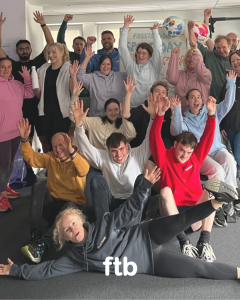
Get the GuestTappy app
Scan the QR code to download the app
The link between physical and mental health is well established. Regular exercise relieves stress and anxiety, improves mood and self-esteem, enhances sleep, and builds social connection. It can even reduce the risk of depression by up to 30%!1
Unfortunately, more than a third of adults in the UK don’t achieve the recommended 150 minutes of physical activity per week.1
It’s no secret that working at an office is associated with a sedentary lifestyle. We counteract this at the freetobook office with our onsite gym and fitness classes, run by our cheerful Wellness Champion, Caroline.
This World Mental Health Day, we chatted with Caroline about the importance of physical and mental health in the workplace – and how to avoid the dreaded tech neck!

The benefits that exercise has on our holistic health are well known: “exercise has a huge impact on our physical health and longevity, but also on our mental wellbeing,” says Caroline.
“The human body is like a machine; it starts to seize up if we’re too sedentary. When you move, the body releases fluids around the joints and the brain kicks in to produce feel-good hormones. There’s a chemical reaction that makes us feel better.”
Exercise is also a stress reliever: “We live in a stressful world; with work, what’s happening politically, climate change. Whatever the stressor, exercise can help combat it.”
“Pilates is my particular passion,” continues Caroline. “When you achieve that mind/body connection, you can use the breath to lower your stress levels and heart rate. Pilates’ focus on alignment is also useful for dealing with the postural issues that come with spending a long time sitting – like tech neck!”
82% of people agree that regular physical activity is important for mental health and wellbeing1. So, what’s stopping us from moving?
“People of all ages are suffering from that sedentary lifestyle. We’re driving to work or working from home, then spending hours sitting at a desk,” thinks Caroline.
“150 minutes of physical activity a week is only 20 minutes a day. But if someone is working from home, you’ll be lucky to clock that up.”
That’s why having an onsite gym and exercise classes at freetobook is so beneficial.
“Taking a break from your desk improves your focus, clarity, and sleep quality – so you return to the office well-rested. The implications of this are huge: not just in terms of how you feel at work, but also how you feel day-to-day which can affect every aspect of your life.”

freetobook’s sports day
This is what motivates Caroline at freetobook’s gym space. “Having the opportunity to create a wellness space at freetobook is great. It’s a brilliant resource that benefits the whole team,” smiles Caroline.
“I get to encourage people in their 20s and 60s to pursue exercise, and it’s incredibly rewarding for them and me. There are people who haven’t done exercise since they were kids, who are now joining classes every week.”
There’s also a social aspect: “The gym brings the team together in a fun way” – a comraderie that was on display at our annual sports day.
“Making these sorts of social connections can be valuable at the workplace. It’s a great leveller; in spin class we have one of freetobook’s co-directors on a bike next to one of our junior developers – it shows team spirit!”
This World Mental Health Day, we’re proud to celebrate the ways movement brings our team together, supporting not just our health, but our happiness at work.
1Moving more is good for our mental health, so what’s stopping us? | Mental Health Foundation
Scan the QR code to download the app